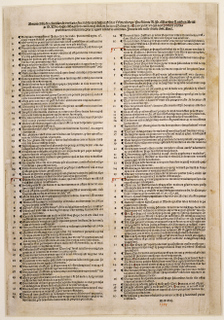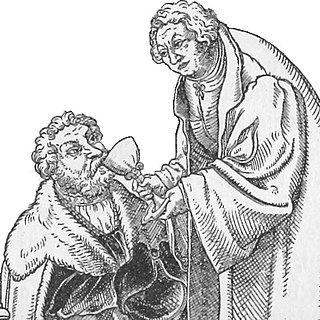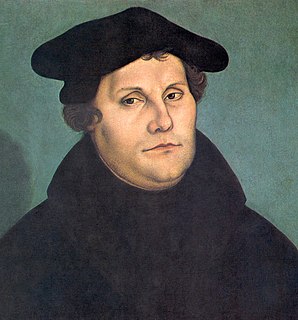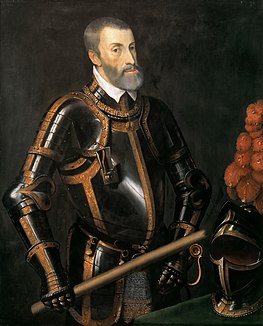
The Four Horsemen of the Apocalypse are described in the last book of the New Testament of the Bible, the Book of Revelation by John of Patmos, at 6:1–8. The chapter tells of a book or scroll in God's right hand that is sealed with seven seals. The Lamb of God opens the first four of the seven seals, which summons four beings that ride out on white, red, black, and pale horses.

Johannes Oecolampadius was a German Protestant reformer in the Reformed tradition from the Electoral Palatinate. He was the leader of the Protestant faction in the Baden Disputation of 1526, and he was one of the founders of Protestant theology, engaging in disputes with Erasmus, Zwingli, Luther and Martin Bucer. He eventually adopted Zwingli's view on the eucharist dispute.

The Ninety-five Theses or Disputation on the Power of Indulgences is a list of propositions for an academic disputation written in 1517 by Martin Luther, professor of moral theology at the University of Wittenberg, Germany. They advanced Luther's positions against what he saw as the abuse of the practice of clergy selling plenary indulgences, which were certificates believed to reduce the temporal punishment in purgatory for sins committed by the purchasers or their loved ones. In the Theses, Luther claimed that the repentance required by Christ in order for sins to be forgiven involves inner spiritual repentance rather than merely external sacramental confession. He argued that indulgences led Christians to avoid true repentance and sorrow for sin, believing that they could forgo it by purchasing an indulgence. They also, according to Luther, discouraged Christians from giving to the poor and performing other acts of mercy, believing that indulgence certificates were more spiritually valuable. Though Luther claimed that his positions on indulgences accorded with those of the Pope, the Theses challenge a 14th-century papal bull stating that the pope could use the treasury of merit and the good deeds of past saints to forgive temporal punishment for sins. The Theses are framed as propositions to be argued in debate rather than necessarily representing Luther's opinions, but Luther later clarified his views in the Explanations of the Disputation Concerning the Value of Indulgences.

The Diet of Worms 1521 was an imperial diet (assembly) of the Holy Roman Empire called by King Charles V. It was held at the Heylshof Garden in Worms, then an Imperial Free City of the Empire. An imperial diet was a formal deliberative assembly of the whole Empire. This one is most memorable for the Edict of Worms, which addressed Martin Luther and the effects of the Protestant Reformation. It was conducted from 28 January to 25 May 1521, with the Emperor Charles V presiding.

Young Turks was a political reform movement in the early 20th century that consisted of Ottoman exiles, students, civil servants, and army officers. They favoured the replacement of the Ottoman Empire's absolute monarchy with a constitutional government. Later, their leaders led a rebellion against the absolute rule of Sultan Abdul Hamid II in the 1908 Young Turk Revolution. With this revolution, the Young Turks helped to establish the Second Constitutional Era in 1908, ushering in an era of multi-party democracy for the first time in the country's history.

The regency of Algiers, was a vassal state of the Ottoman Empire in North Africa lasting from 1515 to 1830, when it was conquered by the French. Situated between the regency of Tunis in the east and the Sharifian Empire in the west, the Regency originally extended its borders from La Calle to the east to Trara in the west and from Algiers to Biskra, and after spread to the present eastern and western borders of Algeria.
Anti-Turkism, also known as Turkophobia or anti-Turkish sentiment, is hostility, intolerance, or racism against Turkish or Turkic people, Turkish culture, Turkic countries, or Turkey itself.

Lutheranism as a religious movement originated in the early 16th century Holy Roman Empire as an attempt to reform the Roman Catholic Church. The movement originated with the call for a public debate regarding several issues within the Catholic Church by Martin Luther, then a professor of Bible at the young University of Wittenberg. Lutheranism soon became a wider religious and political movement within the Holy Roman Empire owing to support from key electors and the widespread adoption of the printing press. This movement soon spread throughout northern Europe and became the driving force behind the wider Protestant Reformation. Today, Lutheranism has spread from Europe to all six populated continents.

The Byzantine–Ottoman wars were a series of decisive conflicts between the Ottoman Turks and Byzantines that led to the final destruction of the Byzantine Empire and the rise of the Ottoman Empire.

The Ottoman–Habsburg wars were fought from the 16th through the 18th centuries between the Ottoman Empire and the Habsburg Empire, which was at times supported by the Holy Roman Empire, Kingdom of Hungary, Polish–Lithuanian Commonwealth, and Habsburg Spain. The wars were dominated by land campaigns in Hungary, including Transylvania and Vojvodina, Croatia and central Serbia.

Suleiman I's campaign of 1529 was launched by the Ottoman Empire to take the Austrian capital Vienna and thereby strike a decisive blow, allowing the Ottomans to consolidate their hold on Hungary. This was in response to Ferdinand I's daring assault on Ottoman Hungary.

The Franco-Ottoman alliance, also Franco-Turkish alliance, was an alliance established in 1536 between the king of France Francis I and the Turkish sultan of the Ottoman Empire Suleiman the Magnificent. The strategic and sometimes tactical alliance was one of the most important foreign alliances of France, and was particularly influential during the Italian Wars. It lasted intermittently for more than two and a half centuries, until the Napoleonic campaign in Ottoman Egypt, in 1798–1801.

Liever Turks dan Paaps, also Liever Turksch dan Paus, was a Dutch slogan during the Dutch Revolt of the end of the 16th century. The slogan was used by the Dutch mercenary naval forces in their fight against Catholic Spain.
Protestantism and Islam entered into contact during the 16th century when Calvinist Protestants in present-day Hungary and Transylvania first coincided with the expansion of the Ottoman Empire in the Balkans. As both were in conflict with the Austrian Holy Roman Emperor and his Roman Catholic allies, numerous exchanges occurred, exploring religious similarities and the possibility of trade and military alliances.

The history of religious pluralism is the fruit of a long development that reaches from antiquity to contemporary trends in postmodernity.
Antemurale Christianitatis was a label used for a country defending the frontiers of Christian Europe from the Ottoman Empire.

A Franco-Hungarian alliance was formed in October 1528 between Francis I of France and John Zápolya, king of Hungary.

The Sacrament of the Body and Blood of Christ—Against the Fanatics is a book by Martin Luther, published in late September or early October 1526 to aid Germans confused by the spread of new ideas from the Sacramentarians. At issue was whether Christ's true body and blood were present in the Lord's Supper, a doctrine that came to be known as the sacramental union.

"Erhalt uns, Herr, bei deinem Wort" is a Lutheran hymn by Martin Luther with additional stanzas by Justus Jonas, first published in 1542. It was used in several musical settings, including the chorale cantata by Johann Sebastian Bach, Erhalt uns, Herr, bei deinem Wort, BWV 126.
























